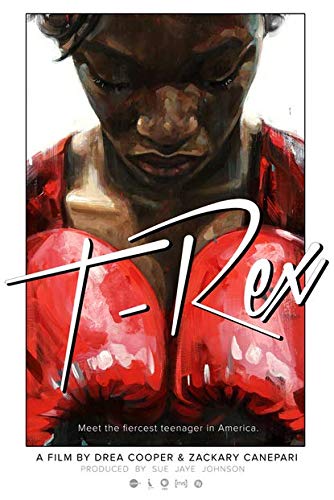
Written by Elias Levey-Swain
Drea Cooper and Zackary Canepari’s spacious and often tranquil sports documentary follows boxer Claressa “T-Rex” Shields before, during, and after her historic gold-medal victory at the 2012 Summer Olympic Games in London. Born, raised, and trained in Flint, Michigan – of water-crisis fame – T-Rex fought through the amateur ranks to become the first female boxer to take home the gold at the Olympics when she was seventeen years old. Ever on the precipice of history, Claressa’s story is bold, unbridled, and told in a way that highlights the essence of her character rather than a distorted or inflated image of a triumphant victor.
We who study film often recite the same several words in response to something that we find particularly moving. We may call a film raw, intense, blunt, brutal, crude, or stunning, solely because it has managed to evoke an emotional response from within us – the viewer. These words, however overused they may be, are especially relevant in the discussion of Cooper and Canepari’s sprawling yet intimate documentary.
T-Rex features neither the emotional manipulation nor instantly palpable frills that have come to be staples of any drama, fiction and otherwise. Wisely, the filmmakers chose to let the content dictate the emotional response; fully embracing the factual narrative in hopes that it would be engaging enough to properly move the film forward. At once, the film is concise and lazy – progressing liberally through an accessible narrative, while utilizing its empty and quiet spaces as moments for the viewer to ponder, process, and digest the heft of the story.
Regarding its characters, T-Rex maintains a focus on relationships. Private interviews with the subjects of the film in conjunction with the raw and candid footage, places an emphasis on the many complex dynamics in Claressa’s life. In many ways, the film more explicitly tells the stories of the people who surround Claressa, allowing her sister, coach, and mother to detail their feelings about the course of events leading up to, and following Shields’ journey to the Olympics. Claressa’s emotions are ever more implicit – existing within an inner dialogue that rests just below the surface of the narrative.
For example, when Claressa goes to fight at the World Championship tournament in China, her coach Jason is unable to go with her. The filmmakers do not make it a point to interview Claressa about this extensively, nor do they manipulate this plot point into the emotional drudgery that one might expect from a less subtle film. Instead, the emotion of Jason’s absence from Claressa’s corner of the ring comes up only briefly during a conversation between Jason and Claressa later in the film. At this point, it becomes clear that she was struggling with resentment toward her coach – also largely the father figure in her life – for not being with her in her time of need. It was not Jason’s fault that he hadn’t come to China, but teenage emotions are hard to read, and harder to control. It is this kind of moment of realization that makes T-Rex an emotional and entirely relatable film.
Perhaps not every member of a film’s audience is able to relate to an athlete, especially one of Claressa’s caliber, but we can almost all relate to the story of a teenager just trying to work through life and its ever apparent tribulations.